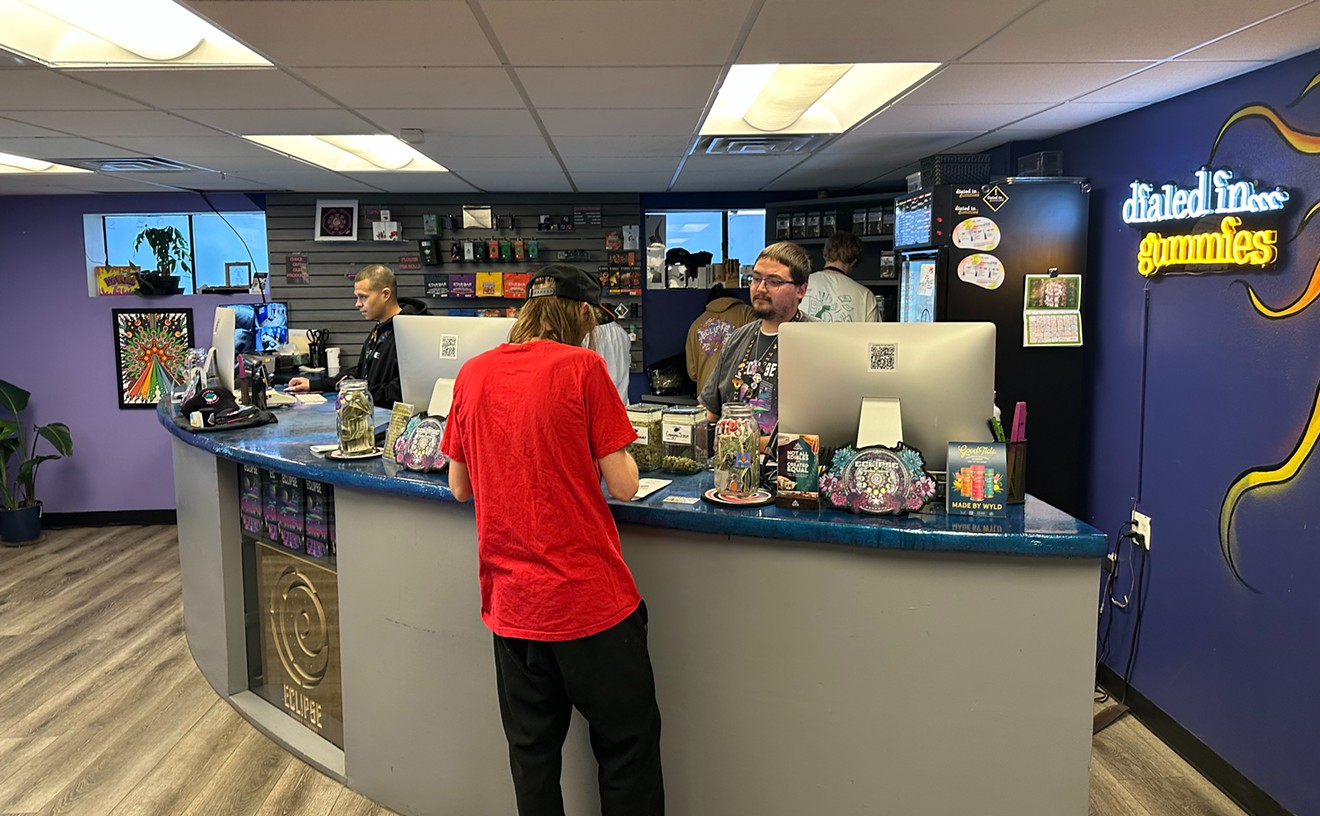When Governor Jared Polis signed Senate Bill 224 last month, he approved a long list of updated cannabis-industry regulations. Among SB 224's many changes to the commercial pot industry was its creation of accelerator business licenses, reserved for people from low-income areas of Colorado who want to start their own cannabis business but don't have industry connections or access to funding. Known as micro licenses around the industry, they would allow startup businesses to use the facilities of established pot companies as they research and create their own cannabis products, which they would completely own.
Cannabis lobbyist Shawn Coleman represents both the Drug Policy Alliance and established businesses within the industry, and believes that adding new players from low-income areas will help diversify the field while potentially benefiting someone previously impacted by cannabis prohibition.
"If you've lived in one of those communities and you are not a previous marijuana business owner, it would allow you to apply for a license, whether it be cultivation or manufacturing, which would allow you to operate on the site of an already existing business," Coleman explains. "The other aspect of it is the capital. The marijuana industry is highly regulated, and that comes with high costs. If you're in a community that doesn't have access to capital, that's a significant barrier to entry."
Already facing increasing consolidation and a dwindling number of available cannabis business licenses in Colorado, would-be cannabis business owners typically need upwards of six figures to fund a new venture. On top of that, the plant's federally illegal status still bars them from taking IRS tax reductions, leaving some dispensaries, growers and infused-product makers with a 70 percent tax rate, or more.
The high cost of entry into the business and Colorado's failure to create social equity programs after recreational pot was legalized in 2012 have been criticized by minority and drug-reform activists, who point to programs in California, Massachusetts and Illinois that prioritize minorities, low-income entrepreneurs and past victims of the War on Drugs for cannabis ownership and employment opportunities.
Through SB 224, Coleman and other lobbyists pushed for language that would create micro licenses, as well as a provision that changed a state law that had banned anyone convicted of a felony within the past five years, or of a drug felony within the past ten years, from becoming a licensed marijuana employee. The new law removed the drug-felon ban and cut the five-year ban for felons to three years.
SB 224 took the low-income areas eligible for micro licenses from the opportunity zones identified by the Colorado Office of Economic Development and International Trade during 2017 tax reforms designed to spur investment around the state. The majority of the 126 communities are located near the eastern, western and southern Colorado borders; a micro license applicant will have to have lived in one of these communities for at least five of the past ten years, but could operate outside of the community once the license is issued.
"These would create something like a commissary kitchen, where I'm going to make my brownies at 10 a.m., and then you can come in and bake at 2:15 p.m., and then someone else can come in at 5 p.m.," Coleman says. "The work areas could be shared by multiple licenses, where they can develop their own products and bring them to market."

Micro license holders must come from the OEDIT's designated low-income areas, highlighted in yellow.
Colorado Office of Economic Development and International Trade
"It does nothing to achieve equity in the cannabis industry, or even move us closer towards it," he argues, "unless we're talking about dramatic changes to the scope of how all cannabis licenses are issued in Colorado — because micro licenses aren't going to do it."
With a new law allowing outside investors and publicly traded companies to hold larger interests in Colorado cannabis companies, both Khalatbari and the MCBA believe that any social equity progress fueled by micro licenses will be killed by increased corporate presences and consolidation within the Colorado cannabis industry. The licenses for cannabis delivery and hospitality businesses also approved by the legislature this session will do more for diversity, they say.
"When you allow publicly traded money to come in Colorado, you're opening the flood to big companies that have zero interest in the people of Colorado or local ownership," Khalatbari explains. "There's a lot of ways you can skin this cat and provide participation for folks. I think we needed to add some of these licenses and grants that are geared more toward smaller businesses."
According to Coleman, further rule-making could create initiatives that provide funding or help micro licensees learn how to secure investors; the state Department of Revenue will continue updating the program as more data about Colorado's cannabis ownership demographics comes in.
"Will there be this huge deluge of applications for micro licenses? I doubt it," Coleman says. "But this is for people who are interested in this space but have been precluded because of those institutional challenges. We want to catch those people. It's a starting point, and the DOR can expand who's eligible."
Anyone with a micro license will need to find a larger business willing to host them, though, which is easier said than done. Large-scale grows, extractors and dispensary chains have loads of proprietary information and other resources they need to protect, according to Dean Heizer, chief legal strategist for the LivWell dispensary brand.
LivWell outwardly supported the micro license provision during this year's legislative session, according to Coleman and other lobbyists, but Heizer says there's still a lot to discuss before the company opens its facilities to other business ventures. The state Marijuana Enforcement Division, which is responsible for overseeing all cannabis business licenses, still has details to iron out before micro licenses are issued — and any pot brand interested in welcoming micro licensees will be paying close attention.
"We generally support any kind of voluntary or incentive-based programs that will help disenchanted communities participate in this industry," Heizer says. "We're obviously interested in participating in that MED rule-making, and if it comes out with something that works for us, we'd definitely consider it. ...The real challenges will be in rule-making, where we figure things out like liability, insurance and confidentiality."
But even Heizer admits that any company taking on micro licensees would probably be doing so as a "good corporate citizen" and not for economic interest, outside of a possible research-and-development opportunity.
"Do I think we could derive a material economic benefit from participating in this? Unlikely, but it could help the community around us, and the overall growth of the industry," he says. "It is possible, if you could work out some sort of sharing agreement, that there might be an R&D opportunity. But there's still some political and community challenges around our industry, and that's where I think the benefit will come from."












